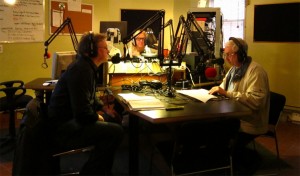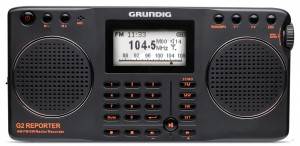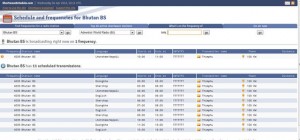
The International Radio Report with Wojtek (left), Janice (center) and Sheldon (right). Photo: RCI Action
Sunday, concerned as I am about the deep cuts to RCI’s (Radio Canada International’s) vital radio programming, I listened to CKUT‘s International Radio Report with much interest. Hosts (and good friends) Sheldon and Janice were joined by Wojtek Gwiazda, RCI Action Committee spokesperson, as their on-air guest. RCI Action is a coalition that has worked to restore RCI funding since cuts in 1991; Wojtek explains some of their history in the interview.
Most importantly, the interview provides insight into the internal reaction to the program cuts and changes. Wojtek makes many excellent points, including the fact that since RCI’s English and French news rooms are being eliminated, Canada will effectively have no international voice, no means to offer their opinion of world events. He also notes that, even though the US has the VOA, and UK has the BBC World Service, these countries also have periodicals such as the New York Times, Wall Street Journal, The Guardian, so forth, all of which carry their voices abroad. Canada, sadly, has no such international news presence. Indeed, I’m aware that The Toronto Star, Canada’s largest newspaper, has very limited international exposure).
If, like me, you’re interested in the recent developments at RCI–or in reductions to radio’s international presence generally–this show is a must-listen.
Click here to download this episode of the International Radio Report. Click here for an audio archive of past shows.
Note that Wojtek Gwiazda, besides his role with RCI Action, also hosts a show on RCI called Masala Canada. On Saturday, he posted the following message “off mic” for his listeners:
Saturday, April 7, 2012 – 13:34
Why the silence? And a budget cut.
I wanted to take a moment to explain why I’ve been so silent on this site in the last few days.
Some of you may have heard by now that this past Wednesday, Canada’s national radio and television public broadcaster CBC/Radio-Canada announced the impact of federal government cutbacks to the financing of the broadcaster.
Many services will be affected, many people will lose their jobs.
At Radio Canada International – the effects are quite devastating.
Our budget of $12.3 million will be reduced to $2.3 million.
At least, two-thirds of our staff will be laid off.
We will no longer broadcast on shortwave. The only presence we’ll have is on the Internet, on our website.
The RCI newsroom will be closed, there will be no newscasts.
Our Russian service will be closed, the Brazilian program eliminated.
What will be left is a presence on our website in English, French, Arabic, Mandarin and Spanish. What kind of presence this will be, is yet to be determined.
And yes, that means, that as with everything else that’s being eliminated, the last edition of MASALA CANADA will be on June 23rd.
So far that is all that we know.
I can tell you that there is a union supported lobby group, the RCI Action Committee, which is actively lobbying to stop the cuts. Whether it will be successful, is unknown.
I’ll give you updates when I can.
All the best,
Wojtek



 (Source:
(Source: 


 In this interview with Levon Sevunts, producer for RCI’s The Link, we get a little more insight into the impact of these cuts at Radio Canada International.
In this interview with Levon Sevunts, producer for RCI’s The Link, we get a little more insight into the impact of these cuts at Radio Canada International.